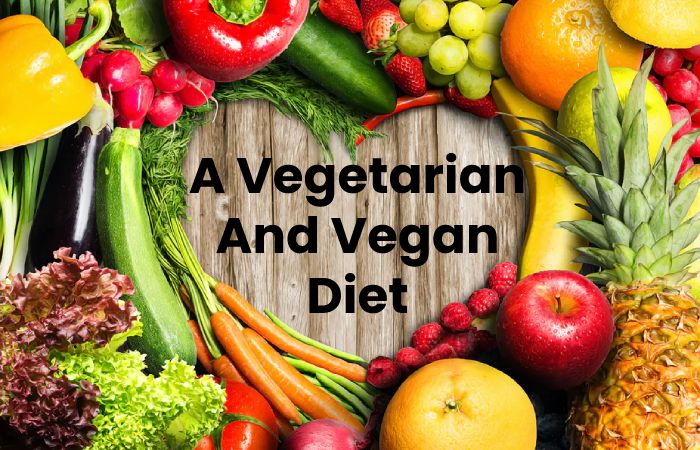Vegetarian Diet
Apart from these trends, some people follow a vegetarian diet mainly because they do not have the means or easy access to meat, fish, and other livestock and agricultural foods. Modern. Compared to a few decades ago, becoming a vegetarian has become more attractive and accessible, thanks to fresh produce throughout the year, more vegetarian food options, and the growing culinary influence of cultures, with mainly plant-based diets.
Table of Contents
Difference Between A Vegetarian And Vegan Diet
Why Is Being A Vegetarian Bad For Your Health?
Is It Dangerous To Be A Vegetarian?

Until recently, being a vegetarian was sometimes considered a bizarre behavior that can disrupt the body. Research on vegetarianism focused mainly on potential nutritional deficiencies.
But in recent years, vegetarianism has shifted towards studies that confirm some health benefits of a meatless and more plant-based diet.
Vegetarianism Or How To Be Vegetarian?
A Nutritionally Balanced Vegetarian Diet
Today, plant-based diets are recognized as nutritionally sufficient and as a way to reduce the risk of many chronic diseases.
Vegetarians’ properly planned and personalized diets are healthy, including vegetarian diets and vegans ( ” vegan ” in English). A nutritionally adequate plan may offer some health benefits in preventing and treating several diseases.
It should remain noted that a special vegetarian diet does not exist because, unless you follow the recommended guidelines for nutritional intake, fat consumption, and healthy weight control, becoming a vegetarian will not necessarily be suitable for everyone.
Indeed, a diet consisting of soda, cheese pizza, supermarket pastries, and the candy is technically vegetarian, yet this diet is potentially harmful to health.
It is essential to ensure you eat a wide variety of fruits, vegetables, and whole grains for your health. It is also necessary to replace saturated and trans fats with good fats, such as nuts, olive oil, and rapeseed (canola) oil. Even from nutritious, low-fat, plant-based foods, weight gain is possible if too many calories remain consumed.
Thus, being a vegetarian (or vegan) also requires practising portion control, reading the labels of foods purchased in stores, and practicing regular physical activity.
Semi-vegetarian, Lacto-vegetarian, low-calorie vegetarian diet.
A vegetarian diet provides many health and wellness benefits without necessarily being die-hard.
For example, a diet model based on the Mediterranean diet emphasizes plant foods with moderate meat consumption.
In this way, even if the goal is not to become completely vegetarian, it is possible to orientate your diet in this direction with a few simple substitutions, such as vegetable protein sources (red beans, chickpeas, tofu, etc. .).
Indeed, the main principles of vegetarianism are of great help to improve a diet by leaving many possibilities to adapt them to each person, as in the flexitarian diet.
Vegetarian Diet: What Diet For A Vegetarian?
Vegetarians and vegans may avoid consuming animal products and foods for similar reasons but to varying degrees. Several vegetarians exist, and vegans ( vegan ) are on the more strict end of the vegetarian spectrum.
These two types of diet are generally considered safe for all stages of life. They may provide various additional benefits for the health and well-being of the whole body, as shown by several studies.
However, vegetarians and vegans need to plan their diet well to avoid long-term health problems.
Although moderate meat consumption benefits heart health, especially when replaced with nutritious plant foods such as whole grains. Wheat germ, pulses (lentils, chickpeas, etc.), fruits, vegetables, nuts, and olive oil, the nutritional quality of plant foods is variable, as pointed out in a study published in August 2020 the European Society of Cardiology.
How To Define Vegan And Vegetarian Diets
What Does A Vegetarian Not Eat?
It is not uncommon to confuse the vegetarian and vegan diet ( vegan ). However, although these diets are very similar, notable differences are coexisting. Choosing one or the other will not require the same commitment or efforts daily and in the long term.
What Is A Vegetarian Diet?
A vegetarian person is a person who does not eat meat, poultry, game, fish, shellfish, or animal slaughter by-products.
Vegetarian diets contain varying levels of fruits, vegetables, grains, legumes, nuts, and seeds.
The inclusion of dairy products and eggs depends on the type of diet you are on.
The Most Common Types Of Vegetarian Diets Are:
- Vegetarian Ovo-Lacto: This diet avoids all animal flesh but tolerates dairy products and eggs.
- Lacto vegetarian: This diet avoids animal flesh and eggs but tolerates dairy products.
- Ovo-vegetarian: this type of diet avoids all animal products except eggs.
- Vegan (or vegan): This diet avoids all animal and animal products.
Note that those who do not eat red meat or poultry but consume fish are considered “pescatarians” (pes-co-vegetarian diet).
This diet keeps fish and seafood, whereas “part-time” vegetarians are often called “flexitarians.”
Although sometimes considered vegetarians, “pescatarians” (peso-vegetarianism) and “flexitarians” (flexitarianism) eat animal flesh. Therefore, they technically do not fall under the definition of vegetarianism.
Related searches
health disadvantages of being a vegetarian
disadvantages of vegetarianism essay
negative effects of vegetarianism
pros and cons of vegetarianism essay
economic disadvantages of vegetarianism
vegan diet benefits and risks
environmental disadvantages of being a vegetarian

